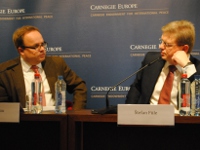Registration
You will receive an email confirming your registration.
IMGXYZ3351IMGZYXCarnegie Europe, the Belarusian Institute for Strategic Studies (BISS), and the Office for a Democratic Belarus hosted an expert forum to discuss the European Union’s policies on Belarus in the context of the latest developments in the country.
The European Commissioner for Enlargement and European Neighbourhood Policy, Stefan Füle, presented his views on existing EU policy towards Belarus and its prospects for success.
Two panels with prominent Belarusian and European experts, including Pavel Daneyko, director of the Belarusian Economic Research and Outreach Centre, Arkady Moshes, senior researcher with the Finnish Institute for International Affairs, and Aliaksei Pikulik, academic director of BISS, debated the political and economic situation in Belarus and its bilateral relationships with the EU and Russia.
With independent polls indicating that Belarusians neither favor the current government’s course nor see any alternative in the opposition, the forum produced recommendations on how to change the existing status quo in Belarus according to the will of the country’s citizens.
Highlights
- A Multidimensional Approach: Füle outlined the European Union’s strategy to achieve reform and democratization in Belarus. He emphasized that, in addition to maintaining the EU’s tough line towards the regime and engaging the political opposition and organized civil society, the EU strives to engage the whole of Belarusian society to achieve the EU’s vision of a European Belarus.
- Between the Eurasian and European Unions: An expert panel agreed that for the Belarusian authorities, Russia represents the ‘less bad’ option for the country’s development, while the EU’s conditionality approach, rewarding or sanctioning neighbors for policy changes or the lack thereof, is seen as a double standard with no promising perspective attached. The panelists argued that the EU must formulate a clear political goal for its engagement with Belarus, with a coordinated, committed, and undiluted approach, even as it simultaneously addresses the democracy deficits in Russia and Belarus.
- A Systemic Economic Crisis and the Prospects for Improvement: Dzmitry Kruk, a researcher at the Belarusian Economic Research and Outreach Centre, noted that Belarus’ current economic crisis is inherently systemic, something the authorities are not willing to admit. While Russia’s financial intervention postponed an economic collapse for the past nine to twelve months, structural reforms are essential to avoid the return of a harsh economic crisis. Kruk and his fellow panelists recommended social, rather than economic intervention, by the EU.
- Potential for Protests: In the wake of the December 2010 crackdown by Belarusian authorities, polls indicate that the willingness of citizens to protest increased from 5.2 percent to 12.3percent, numbers similar to those in Ukraine before the Orange Revolution, explained Andrei Vardamatski, director at Research Laboratory NOVAK. He added that, even though protests on the same scale as in Ukraine did not materialize in Belarus, potential demonstrations would find societal support in face of ongoing dire economic conditions.
A more detailed event summary is available on the website of The Office for a Democratic Belarus.
